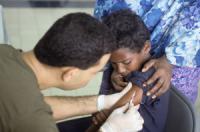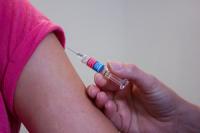-
Experts urge vaccination as U.S. measles cases top 1,000
Federal officials yesterday said U.S. measles cases have reached 1,001, the first time since 1992 that cases have been in quadruple figures, while experts continued to urge vaccination and underscored the safety of the vaccine.
-
-
Current vaccination policies not enough to prevent measles resurgence
Current vaccination policies may not be sufficient to achieve and maintain measles elimination and prevent future resurgence in several advanced countries. “Our results suggest that most of the countries we have studied would strongly benefit from the introduction of compulsory vaccination at school entry in addition to current immunization programs,” says the author of a new study.
-
-
Predicting top 25 U.S. counties at risk for measles outbreaks
A team of researchers has identified 25 U.S. counties that are most likely to experience measles outbreaks in 2019. As of late May, the U.S. has seen more than 800 [cases of measles this year, the highest number in decades. Although measles was officially eliminated from the U.S. in 2000, the ongoing outbreak shows that the nation remains at risk.
-
-
Anti-vaccine advocates spread misinformation at an anti-vaccine rally amid raging measles outbreaks
Andrew Wakefield, Del Bigtree, and other prominent anti-vaccine advocates unleashed fear and toxic misinformation on Monday, 13 May, at a well-attended symposium in New York’s Rockland County, the location of one of the largest and longest-standing measles outbreaks in the country. Beth Mole writes in ArsTechnica that the event was billed as being a “highly informative night of science and discussion addressing your concerns, fears, and doubts,” but that the speakers made numerous unsubstantiated and egregiously false claims—as usual. In one instance, Brooklyn Orthodox Rabbi William Handler reportedly made the unsubstantiated claim that getting measles, mumps, and chickenpox reduces the risk of cancer, heart disease, and stroke by 60 percent. He did not provide a citation.
-
-
Tracking down the people behind a pamphlet that's fueling New York's measles outbreak
Dr. Patricia Ruppert, the health commissioner of Rockland County, New York, where there have been 225 measles cases confirmed since October, told CBS News that misinformation is fueling the rise in cases, especially within the county’s orthodox Jewish community. For at least the last four years, what’s come to be known as the “PEACH pamphlet” has been targeting orthodox Jewish communities in the Northeast. “It holds a lot of unscientific and erroneous information,” Ruppert said. The pamphlet claims vaccines are a contributing factor in causing autism even though the overwhelming consensus of the scientific community is that vaccines do not cause autism. But Ruppert had no idea who is behind the pamphlet. So we tried to find out.
-
-
U.S. measles cases pass 800, on track for record year
With 75 more measles cases reported in United States over the past week, the number of infections topped 800, putting this year on pace to pass the total for 1994, the U.S. Centers for Disease Control and Prevention (CDC) said Monday.
-
-
Breaking down the anti-vaccine echo chamber
In these days of Facebook and Twitter, it is easy enough to block out the opinions of those you disagree with, and only associate with people whose voices reinforce your own opinions. These echo chambers have real-world implications; currently, the U.S. is in the midst of its largest measles outbreak in decades. That’s why it’s important to find ways to communicate across the vaccination divide.
-
-
Are frontline hospitals ready for a patient with Ebola?
Investigators sampled five major frontline hospitals in Maricopa County, Arizona, to perform a gap analysis in how their response would be for a patient with Ebola or another high-consequence pathogen. Saskia v. Popescu writes in Contagion Live that from entering the hospital through the emergency department to cleansing and disinfecting protocols, the investigators evaluated whether health care workers could still answer the questions that were heavily drilled into these hospitals in 2014 following the Ebola cluster in Dallas.
-
-
Worry: Soaring U.S. measles cases set record
Measles was declared officially eliminated in 2000 in the United States, but thanks to an effective misinformation campaign by anti-vaccination activists, measles has been making a comeback: The U.S. has just seen the highest annual record of measles infection in five years – and it is not even May. The World Health Organization (WHO) estimates that 110,000 people, most of them children, died from measles in 2017.
-
-
Measles quarantine orders issues by two Los Angeles universities

The University of California Los Angeles (UCLA) and California State University Los Angeles (CSULA) have issued measles quarantine orders for students that cannot prove evidence of immunizations. More than 500 students, faculty, and staff at UCLA may have come into contact with an infected student who continued to attend classes and go to the library while contagious.
-
-
Islamist gunmen kill polio vaccinator in Pakistan

In Pakistan, a Islamist gunmen on Thursday shot dead a female polio vaccinator and wounded another. Conservative Islamic clerics – and the Taliban — have long been suspicious of the polio vaccine, claiming it is a Western plot to harm or sterilize Muslim children. The Pakistani authorities also arrested ten men in the provincial capital Peshawar for spreading unfounded rumors through fake social media videos that a polio vaccine had led to fainting and vomiting. In recent years, anti-vaccination agitators have killed dozens of people in Pakistan, one of three countries in the world — along with Afghanistan and Nigeria — where wild polio virus is still endemic.
-
-
Measles in LA County; 2 pregnant NYC women infected
In new developments in the U.S. surge of measles cases, Los Angeles County health officials announced they are investigating an outbreak, and New York City authorities said an outbreak centered in the Orthodox Jewish community under way since last fall has reached 390 cases, including infections in two pregnant women.
-
-
Decline in measles vaccination causing resurgence of preventable, nearly eradicated disease

In 2000, measles was declared to be eliminated in the United States, when no sustained transmission of the virus was seen in this country for more than twelve months. Today, however, the United States and many other countries that had also eliminated the disease are experiencing concerning outbreaks of measles because of declines in measles vaccine coverage.
-
-
U.S. measles numbers continue to climb, nearing record
The U.S. measles total climbed by 71 cases last week, the U.S. Centers for Disease Control and Prevention (CDC) said Monday in an update, putting the year’s total at 626, within striking distance of the most cases since the United States officially eliminated the disease in 2000. With weekly measles numbers continuing to grow at a steady clip, a top Food and Drug Administration (FDA) official on Monday released a statement affirming the agency’s continued confidence in the safety and effectiveness of the measles, mumps, and rubella (MMR) vaccine.
-
-
FDA confident in the safety, effectiveness of MMR vaccine
The FDA has joined other scientific and medical groups in an effort to combat the conspiracy-fueled campaign of disinformation and misrepresentation by anti-vaccine activists. “We cannot state strongly enough – the overwhelming scientific evidence shows that vaccines are among the most effective and safest interventions to both prevent individual illness and protect public health,” said Peter Marks, director of FDA’s Center for Biologics Evaluation and Research.
-
More headlines
The long view
A Shining Star in a Contentious Legacy: Could Marty Makary Be the Saving Grace of a Divisive Presidency?
While much of the Trump administration has sparked controversy, the FDA’s consumer-first reforms may be remembered as its brightest legacy. From AI-driven drug reviews to bans on artificial dyes, the FDA’s agenda resonates with the public in ways few Trump-era policies have.
